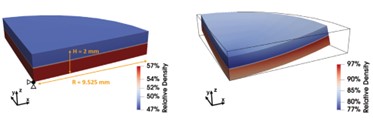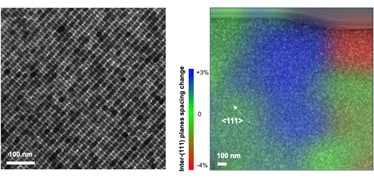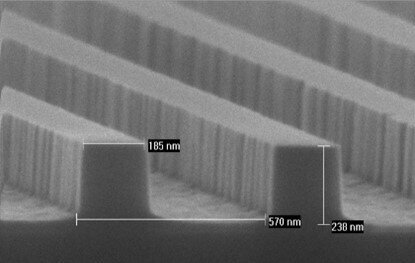Advanced Manufacturing across the Scales (AMS) is a Master’s track in the Mechanical Engineering Master’s Program. This means that you apply for the Master’s Program in Mechanical Engineering (CROHO: 60439) and specialize in AMS. This master’s track offers a two-year program (120 ECTS), with the first year revolving around courses. The second year is dedicated to the internship and graduation project. After completing the program, you receive a Master’s diploma in Mechanical Engineering stating your specialization in Advanced Manufacturing across the Scales.
Year 1 | Core program | 20 ECTS |
| Specialization courses | 20 ECTS |
| Free electives | 15 ECTS |
Professional skills | 5 ECTS | |
Year 2 | Internship | 15 ECTS |
| Graduation project | 45 ECTS |
Year 1
The first-year course program comprises a selection of four core courses (20 ECTS), training you as a future AMS graduate in mechanical engineering. On top of the Microfabrication Methods, you choose three core courses from the list below:
- Microfabrication Methods
- Advanced Engineering Mathematics
- Advanced Computational Continuum Mechanics
- Experimentation for Mechanical Engineering
- Scientific Computing for Mechanical Engineering
- Engineering Optimization
- Fracture Mechanics – Theory and Application
With four specialization courses (20 ECTS), AMS trains you to become a disciplinary expert. On top of Soft Materials Processing and Advanced and Additive Manufacturing, you select three more courses from the following:
- Composite and Light-weight Materials
- Structural performance of polymers and polymer composites
- Multiscale Modeling for Polymer Mechanics
- Heat and Flow in Microsystems
- Computational and Experimental Micro-mechanics
- Integrated System Design
- Non-linear Control
- Lab on a chip Microdevices
- OptoMechatronics
- Modeling and Control of Manufacturing Systems
- Rheology
- Optics for Mechanical Engineers
Your course program is complemented by 15 ECTS of free electives. These free electives enable you to customize your program to your specific interests by following courses in related disciplines or even in other TU/e departments. As part of the first-year course program, you also follow professional skills courses (5 ECTS), focused on career development, teamwork, academic writing and more.
Year 2
The second year is all about learning how to apply the disciplinary knowledge and skills acquired throughout your course program. In your internship (15 ECTS) you apply your know-how in an industry project or at a research institute. Being an ambassador of the AMS Master’s track, you gain an impression of your professional future. After your internship, you work on your graduation project (45 ECTS). This AMS graduation project revolves around academic research, allowing you to specialize in the AMS aspects that interest you the most.
Graduation project
In your graduation project you apply the know-how and skills acquired through your course program and internship project to an academic research project. Research topics can focus on detailed aspects of Advanced Manufacturing – such as computational modeling of material behavior, technology development, design questions or experimental methods. Your graduation project comprises two phases. In the first phase of the project, with the support of your AMS project supervisor, you detail your research questions and methodology. In the second phase, you perform your research under the supervision of an AMS researcher. This second phase will result in a master’s thesis. You defend your thesis before a panel of experts and present your findings in public.
Examples of recent AMS graduation projects are:

Modeling the production of membranes for green hydrogen generation
The fabrication of many key components of devices for the green energy transition entails multiphysics manufacturing processes, which require complex and costly experimental campaigns to be optimized. Physics-informed simulations can boost the design of manufacturing strategies, by capturing the key mechanisms governing each process step and enabling smart guiding of experimental tests.

Validating constitutive models for new hybrid materials
New materials are continuously being developed to fulfill ever more demanding requirements for high-tech devices. Many of these materials are hybrid and feature custom structures down to the nanoscale. Understanding and controlling their structural performance is crucial to enable applications. Advanced lab analysis allows visualizing and testing materials down to sub-nano scales.

3D printing of polymer-derived ceramics
Ceramics are high-performing materials with unmatchable refractory properties, but manufacturing ceramic parts into complex shapes remains a challenge. A promising strategy lies in printing polymers that can be converted into ceramics upon pyrolysis. To achieve this goal, materials have to be optimized for rheology, printability and composition.

Advanced lithography to build an organ-on-a-chip
Lithography techniques are known for the manufacture of integrated circuit chips for computing. These are typically based on electrical information processing and, more recently, light processing circuits. When integrated circuit concepts such as these find their way into medical and biomedical applications, like microfluidic organ-on-chips, material incompatibility in manufacturing often plays a role. Many new techniques have been developed for this purpose to fabricate small scale devices circumventing the well-established semiconductor industry lithographic techniques. Soft-lithography using polydimethylsiloxane (PDMS) is the preferred chip material to bridge this gap, although it has its limitations in upscaling production and mass uses. To address this impasse, advanced lithography techniques merging manufacturability and application requirements need to be researched and developed.
The Mechanical Engineering pre-Master’s program
The Mechanical Engineering (ME) pre-Master’s program is intended for students who have not been granted direct admission to the AMS Master’s track. These students include:
- Bachelor graduates from TU/e programs (or other Dutch universities) who did not obtain a bachelor’s in Mechanical Engineering or equivalent
- Graduates from University of Applied Sciences (HBO) Mechanical Engineering programs or equivalent
The ME pre-Master’s typically takes one semester and is worth 30 ECTS. You acquire the necessary background to enable a seamless and successful transition into the AMS Master’s track. Included in this ME pre-Master’s are courses in calculus, mechanics and thermodynamics. For further information please consult the Education Guide*.
*Note: current students use the Education Guide as a source of information. It contains detailed, practical information that is important during your study program. Prospective students can consult the Education Guide for additional information.